

Foodshare. FOODSHARE SCHOOLS – “Growing to Give” The Foodshare “Growing to Give” project is encouraging every school in the UK and around the world to create a Foodshare Bed and grow fresh produce for a local charity.
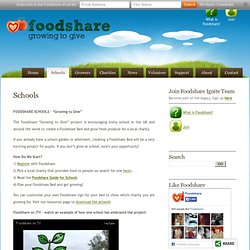
If you already have a school garden or allotment, creating a Foodshare Bed will be a very exciting project for pupils. If you don’t grow at school, now’s your opportunity! How Do We Start? 1) Register with Foodshare. 2) Pick a local charity that provides food to people (or search for one here). 3) Read the Foodshare Guide for Schools 4) Plan your Foodshare Bed and get growing! You can customise your own Foodshare sign for your bed to show which charity you are growing for. Foodshare on ITV – watch an example of how one school has embraced the project: A Case Study: Milton Primary School The Growing To Give project originally started as an idea at Milton Primary School in Cambridgeshire.
The Harvest Festival Is Not Just For October! Food for Life Partnership : Pupil Voice. Pupil voice Engaging pupil voice is fundamentally about involving students in the running and changing of their school and community.
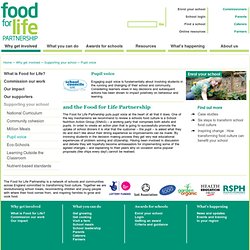
Considering learners views in key decisions and subsequent actions has been shown to impact positively on behaviour and learning. The Food for Life Partnership puts pupil voice at the heart of all that it does. One of the key mechanisms we recommend to review a schools food culture is a School Nutrition Action Group (SNAG) – a working party that comprises both adults and pupils. In order to create an action plan that is going to successfully promote the uptake of school dinners it is vital that the customer – the pupil – is asked what they do and don’t like about their dining experience so improvements can be made.
By involving students in the decision making process they get very real educational experiences of problem solving and citizenship. The tools we need. We send tools to Africa in response to requests from our partners.
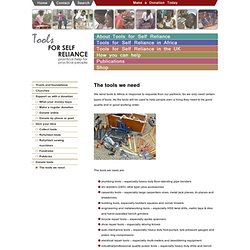
So we only need certain types of tools. As the tools will be used to help people earn a living they need to be good quality and in good working order. The tools we need are: We also need items of haberdashery and dressmaking fabric. Although we send Singer round-bobbin treadle machines, we don’t need any more of these machines at present because we are meeting demand from existing stocks. The tools we don’t need Sorry, we don’t need any of the following: imperial spannershydraulic car jacksbroken, poor quality or disposable toolstypewriters, computers, books, lawnmowers, cooking pots, knitting machines, domestic quality power toolsgardening tools – see belowbicycles – see below. Faiths & nature. Leading UK Jewish, Christian and Muslim environmentalists have come together to launch Sharing Eden a unique handbook that uses the teachings of the Abrahamic faiths to encourage a greener lifestyle for all.
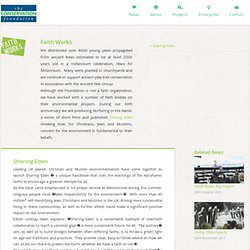
As the Dalai Lama emphasised in his prayer service at Westminster during the summer, religious people must take responsibility for the environment. With more than 45 million* self-identifying Jews, Christians and Muslims in the UK, driving more sustainable living in these communities, as well as further afield, could make a significant positive impact on our environment. Editor Lindsay Swan explains: Sharing Eden is a remarkable example of interfaith collaboration to reach a common goal a more sustainable future for all.
The authors aim, as well as to build bridges between often-differing faiths, is to throw a green light on age-old traditions and practices. Mapping / surveys. Camden. The Postcode Plants Database. The Conservation Gardening Against The Odds. The awards are open to individual gardeners and community groups all over the country who garden against the odds to create beautiful spaces that enrich their own life and the lives of those around them.
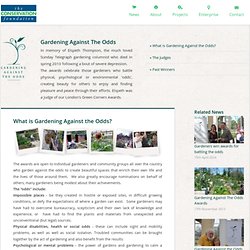
We also greatly encourage nominations on behalf of others, many gardeners being modest about their achievements. The "odds" include: Impossible places - be they created in hostile or exposed sites, in difficult growing conditions, or defy the expectations of where a garden can exist. Some gardeners may have had to overcome bureaucracy, scepticism and their own lack of knowledge and experience, or have had to find the plants and materials from unexpected and unconventional (but legal) sources. Physical disabilities, health or social odds - these can include sight and mobility problems, as well as well as social isolation.
Psychological or mental problems - the power of gardens and gardening to calm a troubled mind and spirit is well recognised. Camden in bloom. We’re delighted to announce this year's Camden in Bloom: ‘Greener Together’.

We’re striving for 2014’s scheme to be bigger, more creative and diverse than ever before with highlights to include Chris Collins, former Blue Peter gardener, running a series of growing workshops for the Camden community in parallel to the competition. This year we have partnered with Project Dirt to help deliver the competition. This marks the start of a new way of delivering and promoting Camden in Bloom. We’d love as many people as possible to get involved this year, so tell your friends and local businesses about the competition.
If you use social media, please use the hashtag #CamdeninBloom. Categories This year’s schools categories are: One Pot Pledge®